专题六-----情态动词、主谓一致
主谓一致知识点总结
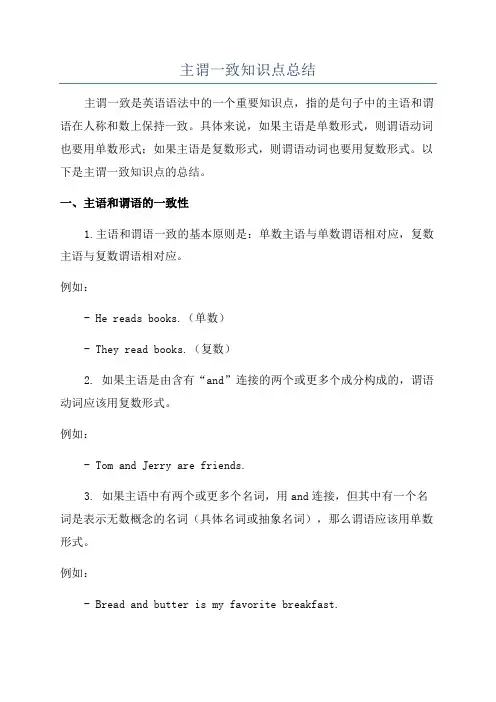
主谓一致知识点总结主谓一致是英语语法中的一个重要知识点,指的是句子中的主语和谓语在人称和数上保持一致。
具体来说,如果主语是单数形式,则谓语动词也要用单数形式;如果主语是复数形式,则谓语动词也要用复数形式。
以下是主谓一致知识点的总结。
一、主语和谓语的一致性1.主语和谓语一致的基本原则是:单数主语与单数谓语相对应,复数主语与复数谓语相对应。
例如:- He reads books.(单数)- They read books.(复数)2. 如果主语是由含有“and”连接的两个或更多个成分构成的,谓语动词应该用复数形式。
例如:- Tom and Jerry are friends.3. 如果主语中有两个或更多个名词,用and连接,但其中有一个名词是表示无数概念的名词(具体名词或抽象名词),那么谓语应该用单数形式。
例如:- Bread and butter is my favorite breakfast.4. 如果主语是由连词“either…or”或“neither…nor”连接的两个名词构成的,谓语动词的单复数应与紧挨着的名词一致。
例如:5. 如果主语是由连词“not only…but also”连接的两个名词构成的,谓语动词的单复数应与紧挨着的名词一致。
例如:- Not only the teacher but also the students are going to the park.二、主谓一致的特殊情况1. 主语是以“everyone, everybody, someone, somebody, no one, nobody, anyone, anybody, each”等单词开头的不定代词时,谓语动词应该用单数形式。
例如:- Everyone knows the answer.2. 对于由and连接的两个主语,如果它们指的是同一个人或同一个物,谓语动词应该用单数形式。
例如:- Tom and Jerry is a famous cartoon.3. 对于固定短语“a number of + 名词”,谓语动词应该用复数形式。
2024年初中英语语法专题复习之主谓一致详解
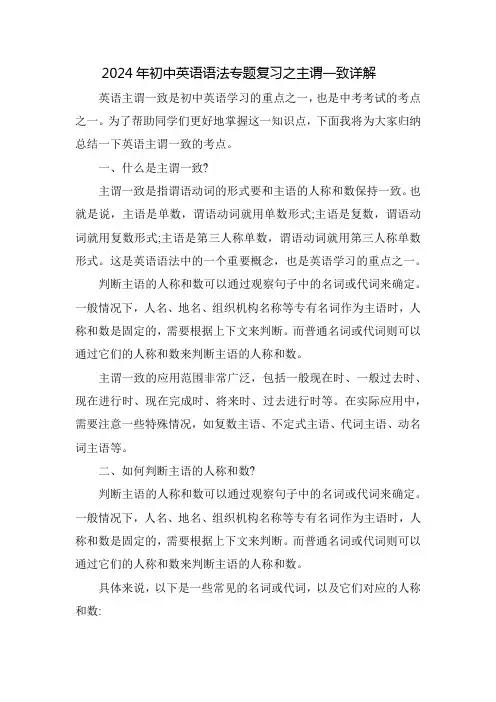
2024年初中英语语法专题复习之主谓一致详解英语主谓一致是初中英语学习的重点之一,也是中考考试的考点之一。
为了帮助同学们更好地掌握这一知识点,下面我将为大家归纳总结一下英语主谓一致的考点。
一、什么是主谓一致?主谓一致是指谓语动词的形式要和主语的人称和数保持一致。
也就是说,主语是单数,谓语动词就用单数形式;主语是复数,谓语动词就用复数形式;主语是第三人称单数,谓语动词就用第三人称单数形式。
这是英语语法中的一个重要概念,也是英语学习的重点之一。
判断主语的人称和数可以通过观察句子中的名词或代词来确定。
一般情况下,人名、地名、组织机构名称等专有名词作为主语时,人称和数是固定的,需要根据上下文来判断。
而普通名词或代词则可以通过它们的人称和数来判断主语的人称和数。
主谓一致的应用范围非常广泛,包括一般现在时、一般过去时、现在进行时、现在完成时、将来时、过去进行时等。
在实际应用中,需要注意一些特殊情况,如复数主语、不定式主语、代词主语、动名词主语等。
二、如何判断主语的人称和数?判断主语的人称和数可以通过观察句子中的名词或代词来确定。
一般情况下,人名、地名、组织机构名称等专有名词作为主语时,人称和数是固定的,需要根据上下文来判断。
而普通名词或代词则可以通过它们的人称和数来判断主语的人称和数。
具体来说,以下是一些常见的名词或代词,以及它们对应的人称和数:人名:第三人称单数,如John、Mary等;第一人称复数,如We、They等。
地名:第三人称单数,如New York、Beijing等;第一人称复数,如We、They等。
组织机构名称:第三人称单数,如The White House、The Pentagon 等;第一人称复数,如We、They等。
代词:第三人称单数,如He、She、It等;第一人称复数,如We、They等。
普通名词:单数形式,如book、dog等;复数形式,如books、dogs 等。
需要注意的是,有些名词或代词在使用时会有变化,例如单数变为复数、第三人称变为第一人称等。
2021年英语中考6-主谓一致 句型转换 单词填空类(解析版)
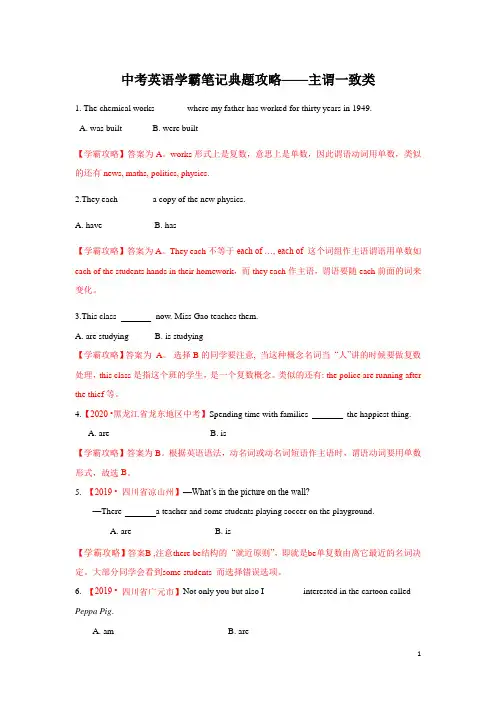
中考英语学霸笔记典题攻略——主谓一致类1. The chemical works_______ where my father has worked for thirty years in 1949.A. was builtB. were built【学霸攻略】答案为A。
works形式上是复数,意思上是单数,因此谓语动词用单数,类似的还有news, maths, politics, physics.2.They each _______ a copy of the new physics.A. haveB. has【学霸攻略】答案为A。
They each不等于each of …, each of 这个词组作主语谓语用单数如each of the students hands in their homework,而they each作主语,谓语要随each前面的词来变化。
3.This class now. Miss Gao teaches them.A. are studyingB. is studying【学霸攻略】答案为A。
选择B的同学要注意, 当这种概念名词当“人”讲的时候要做复数处理,this class是指这个班的学生,是一个复数概念。
类似的还有: the police are running after the thief等。
4.【2020 •黑龙江省龙东地区中考】Spending time with families the happiest thing.A. areB. is【学霸攻略】答案为B。
根据英语语法,动名词或动名词短语作主语时,谓语动词要用单数形式,故选B。
5. 【2019 • 四川省凉山州】—What’s in the picture on the wall?—There a teacher and some students playing soccer on the playground.A. areB. is【学霸攻略】答案B ,注意there be结构的“就近原则”,即就是be单复数由离它最近的名词决定。
46_专题六 时态、语态和主谓一致

考点清单 栏目索引
考点清单
一、动词时态的一般体
考点一 时态
语境运用 单句填空 1.(2018课标全国卷Ⅱ)The Chinese Ministry of Agriculture finds that be-
tween 2005—when the government started (start)a soil-testing pro-
答案 meant 句意:大猩猩确实有不好斗的本性,那只巨大的动物并不 是真的要伤害我。本题考查时态。根据下文可知,本空用一般过去时, 故填meant。
3.—Dr.Jackson is not in his office at the moment. —All right.I will call (call) him later.
或存在的状态。
There goes the bell.铃响了。
考点清单 栏目索引
2.一般过去时 (1)一般过去时的构成 1)一般过去时用动词的过去式表示。 2)was用于第一、三人称单数,were用于其他人称。 3)注意以元音字母加y结尾的动词,一般直接加-ed,如:play→played。 (2)一般过去时的用法 一般过去时除了可以表示过去经常性、习惯性的动作或状态外,还有下 列用法:
栏目索引
专题六 时态、语态和主谓一致
栏目索引
考向分析 动词的时态、语态和主谓一致是高考的重点考点,有的试题单独考查的 是某种时态的用法,如一般现在时、一般过去时、现在完成时等,而有的试题 会把时态和语态、时态和主谓一致融合起来进行考查,也有的试题综合性很 强,会把时态、语态和主谓一致三个考点融合在一个小题中进行考查。
考点清单 栏目索引
注意:was going to还可表示“过去本打算做某事,但未做”的意思。 —Tom,you didn't come to the party last night? —I was going to,but I suddenly remembered I had homework to do. ——汤姆,你昨天晚上没来参加聚会吗? ——我本打算要来的,但是我突然记起来我有作业要做。
初中英语语法之主谓一致
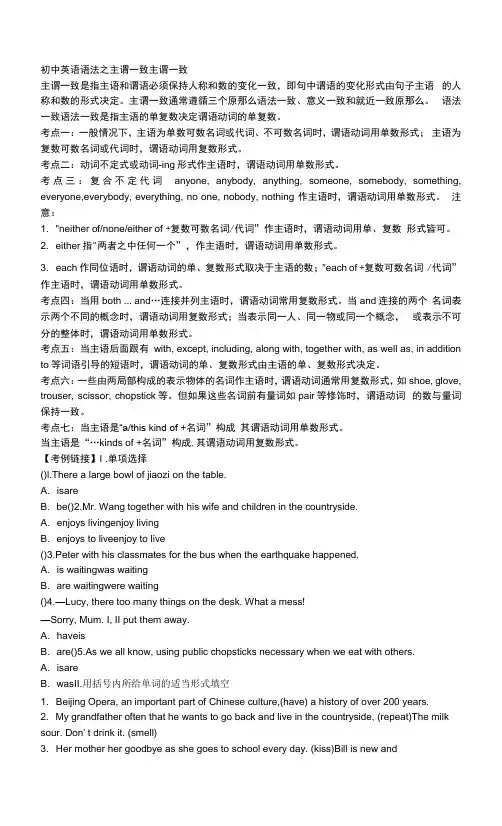
初中英语语法之主谓一致主谓一致主谓一致是指主语和谓语必须保持人称和数的变化一致,即句中谓语的变化形式由句子主语的人称和数的形式决定。
主谓一致通常遵循三个原那么语法一致、意义一致和就近一致原那么。
语法一致语法一致是指主语的单复数决定谓语动词的单复数。
考点一:一般情况下,主语为单数可数名词或代词、不可数名词时,谓语动词用单数形式;主语为复数可数名词或代词时,谓语动词用复数形式。
考点二:动词不定式或动词-ing形式作主语时,谓语动词用单数形式。
考点三:复合不定代词anyone, anybody, anything, someone, somebody, something, everyone,everybody, everything, no one, nobody, nothing 作主语时,谓语动词用单数形式。
注意:1. "neither of/none/either of +复数可数名词/代词”作主语时,谓语动词用单、复数形式皆可。
2. either指"两者之中任何一个”,作主语时,谓语动词用单数形式。
3. each作同位语时,谓语动词的单、复数形式取决于主语的数;"each of +复数可数名词/代词”作主语时,谓语动词用单数形式。
考点四:当用both ... and…连接并列主语时,谓语动词常用复数形式。
当and连接的两个名词表示两个不同的概念时,谓语动词用复数形式;当表示同一人、同一物或同一个概念,或表示不可分的整体时,谓语动词用单数形式。
考点五:当主语后面跟有with, except, including, along with, together with, as well as, in addition to等词语引导的短语时,谓语动词的单、复数形式由主语的单、复数形式决定。
考点六:一些由两局部构成的表示物体的名词作主语时,谓语动词通常用复数形式,如shoe, glove, trouser, scissor, chopstick等。
2020年英语中考复习专题-主谓一致讲解和练习(包含答案)
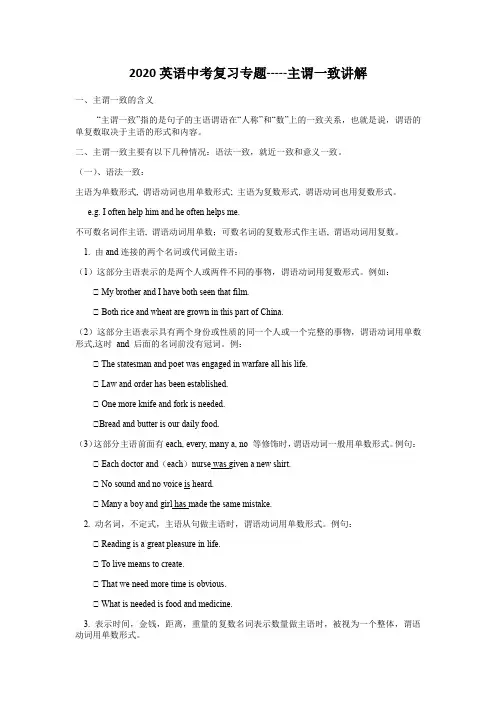
2020英语中考复习专题-----主谓一致讲解一、主谓一致的含义“主谓一致”指的是句子的主语谓语在“人称”和“数”上的一致关系,也就是说,谓语的单复数取决于主语的形式和内容。
二、主谓一致主要有以下几种情况:语法一致,就近一致和意义一致。
(一)、语法一致:主语为单数形式, 谓语动词也用单数形式; 主语为复数形式, 谓语动词也用复数形式。
e.g. I often help him and he often helps me.不可数名词作主语, 谓语动词用单数;可数名词的复数形式作主语, 谓语动词用复数。
1. 由and连接的两个名词或代词做主语:(1)这部分主语表示的是两个人或两件不同的事物,谓语动词用复数形式。
例如:① My brother and I have both seen that film.① Both rice and wheat are grown in this part of China.(2)这部分主语表示具有两个身份或性质的同一个人或一个完整的事物,谓语动词用单数形式,这时and 后面的名词前没有冠词。
例:① The statesman and poet was engaged in warfare all his life.① Law and order has been established.① One more knife and fork is needed.①Bread and butter is our daily food.(3)这部分主语前面有each, every, many a, no 等修饰时,谓语动词一般用单数形式。
例句:① Each doctor and(each)nurse was given a new shirt.① No sound and no voice is heard.① Many a boy and girl has made the same mistake.2. 动名词,不定式,主语从句做主语时,谓语动词用单数形式。
情态动词and主谓一致
情态动词and主谓⼀致情态动词的定义:情态动词是⼀种本⾝有⼀定的词义,表⽰说话⼈的情绪,态度或语⽓的动词,但不能单独作谓语, 只能和其他动词原形构成谓语。
We can be there on time tomorrow.我们明天能按时去那⼉。
May I have your name?我能知道你的名字吗?Shall we begin now?我们现在就开始吗?You must obey the school rules.你必须遵守校规。
情态动词数量不多,但⽤途⼴泛,主要有下列:can (could), may (might), must,mustn't , need, ought to, dare (dared), shall (should), will (would) .情态动词的位置:情态动词在句中放在谓语动词之前, 谓语动词前若有助动词,则在助动词之前,疑问句中, 情态动词则在主语之前。
I can see you. Come here。
我能看见你,过来吧。
He must have been away.他⼀定⾛了。
What can I do for you?你要什么?How dare you treat us like that!你怎能那样对待我们!情态动词的特点:情态动词⽆⼈称和数的变化, 情态动词后⾯跟的动词需⽤原形,否定式构成是在情态动词后⾯加 "not"。
个别情态动词有现在式和过去式两种形式, 过去式⽤来表达更加客⽓, 委婉的语⽓, 时态性不强, 可⽤于过去,现在或将来。
He could be here soon。
他很快就来。
We can't carry the heavy box.我们搬不动那箱⼦。
I'm sorry I can't help you。
对不起,我帮不上你。
情态动词的⽤法:can (could) 表⽰说话⼈能,可以,同意,准许,以及客观条件许可,could 为 can 的过去式。
中考英语知识点梳理主谓一致讲解
中考英语知识点梳理主谓一致讲解主谓一致是指主语和谓语在人称和数上保持一致。
在英语中,主谓一致是非常重要的语法规则,它能够帮助我们正确地表达句子的语法结构和意思。
下面是关于中考英语主谓一致的知识点梳理。
1.一般情况下,主谓一致是指主语是单数时,谓语动词要用第三人称单数形式;主语是复数时,谓语动词要用原形。
例:- He plays basketball every day.(他每天都打篮球。
)- They play basketball every day.(他们每天都打篮球。
)2. 当主语是第三人称单数时,谓语动词要加上-s或-es。
例:- She likes reading.(她喜欢阅读。
)- He goes to school by bus.(他坐公交车去学校。
)3. 当主语是以-s, -ss, -sh, -ch, -x, -o结尾的名词时,谓语动词要加上-es。
例:- The bus stops here.(公交车在这里停。
)- Tom watches TV every evening.(汤姆每天晚上看电视。
)4. 当主语是以辅音字母+y结尾的名词时,谓语动词要变成以-ies结尾。
例:- The baby cries all night.(婴儿整晚哭。
)- The puppies play in the garden.(小狗在花园里玩。
)5.当主语是以元音字母+y结尾的名词时,谓语动词要加上-s。
例:- The toy is on the bed.(玩具在床上。
)- The boy stays at home.(男孩待在家里。
)6.当主语是由两个或多个名词作并列主语时,谓语动词要用复数形式。
例:- Tom and his friends are going to the park.(汤姆和他的朋友们要去公园。
)- My father and mother are doctors.(我的爸爸和妈妈是医生。
语法系列复习专题六情态动词、主谓一致.doc
语法系列复习专题六-----情态动词、主谓一致情态动词一、一般疑问句中几个情态动词的问与答1. Need I/he/…?Yes,you/he/…must.(不用need)2. Must I/ he/…?No,you/ he/…needn’t/don’t(doesn’t,won’t)have to.(不用mustn’t)3. May I/ he/…?No,you/ he/…mustn’t.(少用may not)4. Could(Can)you…?Yes,I can (不用could)5. Shall I/she/ he…?No,you(she,he)needn’t/can’t/mustn’t二、情态动词表“推测”1.can,may,must使用的句式:1)肯定陈述句中:must表“肯定、必定、一定”意,may/might表“也许,或许”意。
2)否定陈述句中:can’t/couldn’t表“不可能”意,may not/might not表“也许不、可能不”意。
3)疑问句中:只能用can或could,不能用must,may或might。
注意:表推测的could,might并不是指过去时间,而是表示比can,may把握性略小些的情况。
2.对目前状态的推测:1)must/may/might/can/could+be+表语例如:She must be a teacher.她肯定是老师。
She can’t/couldn’t be a doctor.她肯定不是医生。
He may not/might not be a doctor.他可能不是医生。
2)must/may/might/can/could+一些不能用于进行时的静态动词(如:have,exist,live,like,hate,own,belong to等)例如:She must have her own car,for she has a lot of money.That kind of bird may live in the valleys.3.对目前正在发生的事情进行推测:句式:must/may/might/can/could+be doing例如:They must be waiting for us.他们肯定正在等我们。
英语语法:主谓一致的第一动词和情态动
英语语法:主谓一致的第一动词和情态动上一期介绍了英语语法:主谓一致的搭配表。
这一期学习英语语法:主谓一致的第一动词和情态动。
英语谓语的第一个动词(包括助动词、情态动词、系动词、实义动词)以词形变化的方式体现与其主语在人称、数两个方面的搭配关系,这些搭配关系就叫主谓一致关系。
2.只有谓语的第一个动词与主语的人称、数存在搭配关系,与谓语中的第二、第三、第四个动词没有任何关系。
他将来是一个护士。
╳He will is a nurse.√He will be a nurse.她肯定已经改变想法了。
╳She must has changed her idea.√She must have changed her idea.3.谓语用情态动词时无人称和数的变化。
情态动词经常有作谓语的第一个动词,但它们没有人称、数的词形变化,它们后面只能跟动词原形。
也就是说,谓语用情态动词时不管人称和数的问题,这就太简单了。
情态动词:can, may, must,will, shall, would, should, could, might, need, dare, ought to, had betterI/We/You/He/She/It/They can do it.我/我们/你(你们)/他/她/它/他们能做到。
I/We/You/He/She/It/They could do it.我/我们/你(你们)/他/她/它/他们能做到。
(与上一句比较,现在式与过去式的区别,could语气比can委婉一些。
)I/We/You/He/She/It/They might do it.我/我们/你(你们)/他/她/它/他们可以做。
例句:1.We can get sick. They can get sick. They can die.【VOA Special, 2016.9】我们会生病。
动、植物也会生病。
它们会死亡。
1.So what can we, what can governments, what can companies do?【TED演讲】那么我们,政府和企业能够做些什么呢?1.You know, you could be next. It could be Denmark next. It could be Dexit.【NPR News, 2016.6】他们的国家可能成为下一个脱欧的国家。
- 1、下载文档前请自行甄别文档内容的完整性,平台不提供额外的编辑、内容补充、找答案等附加服务。
- 2、"仅部分预览"的文档,不可在线预览部分如存在完整性等问题,可反馈申请退款(可完整预览的文档不适用该条件!)。
- 3、如文档侵犯您的权益,请联系客服反馈,我们会尽快为您处理(人工客服工作时间:9:00-18:30)。
情态动词、主谓一致专练1. The possibe____often proved impossible.A. haveB.hasC.areD.will2.Neither you nor I am mad,____?A.are youB.aren’t IC.am ID.are we3.You don’t think I am wrong,____?A.don’t youB.do youC.aren’tD.am I4.It was Lin Song who broke the rules of the school,____?A.wasn’t itB.didn’t heC.was itD.did he5.Bruce must have been in China for a long time,_____?A.hasn’t heB.mustn’t heC.Isn’t heD.wasn’t he6.What the teacher has said is true,____?A.has heB.hasn’t heC.is itD.isn’t it7.It must have snowed last night,____?A.isn’t itB.haven’t heC.mustn’t itD.didn’t it8.It’s the first time that Xiao Qing has been to Tianjin,_____?A.has sheB.is itC.hasn’t sheD.isn’t it9. The trousers_____fit for him.A.isB.areC.mustD.do10.He rather than Li Ying and Wang Ping____praised by the teacher.A.areB.isC.wereD.was11.Where is my pen?I_____it. (NMET)A.should have lostB.must have lostC.would have lostD.might lose12.A computer____think for itself ; it must be told what to do.(NMET)A.can’tB.couldn’tC.may notD.might not13.We_____last night ,but we went to the concert instead. (NMET)A.must have studiedB.might studyC.should have studiedD.would study14.I didn’t hear the phone ,I_____asleep. (NMET)A.must beB.must have beenC.should beD.should have been15.Be sure to write to us,_____? (NMET)A.will youB.aren’t youC.can youD.mustn’t you16.I didn’t see her in the meeting-room this morning.She____at the meeting.(上海)A.mustn’t have spokenB.shoudn’t have spokenC.needn’t have spokenD.couldn’t have spoken17.There is plenty of time.She____. (NMET)A.must have hurriedB.needn’t have hurriedC.must not hurryD.couldn’t have hurried18.You don’t______to go there if you have no time.(上海)A.needB.wantC.mustD.ought19.Sir,you_____be sitting in this waiting-room.It is for women and children only.(上海)A.oughtn’t toB.can’tC.won’tD.don’t20.Tom ought not to_____me your secret ,but he meant no harm. (NMET)A.have toldB.tellC.be tellingD.having told21.It’s nearly seven o’clock.Jack_____be here at any moment.(NMET)A.mustB.needC.shouldD.can22.Your coat is dirty,_____it for you?A.Am I washingB.Will I washC.Am I going to washD.Shall I wash23.No one _____that to his face.A.dare sayB.dare to sayC.dares sayingD.dares said24.There used to be a church in the east of the town,_____?A.didn’t thereen’t to thereed thereedn’t to there25._____you be happy!A.CanB.MayC.MustD.Would26.Put on more clothes . You_____be feeling cold with only a shirt on.A.wouldB.canC.couldD.must27.-Why didn’t you answer when I called you?-I_____but you didn’t hear me.A.had toB.couldn’tC.didn’t answerD.did28.I_____that time is more valuable than money.A.hardly need sayB.need hardly sayC.need hardly to sayD.hardly need to say29.I____like to become a pianist some day.A.willB.mayC.wouldD.shall30 He_____there now,but I am not sure.A.maybeB.may beC.may have beenD.might have been31.-I didn’t see him yesterday.-Oh,but you______.A.ought toB.should haveC.can’t haveD.may have32.-Where were you this morning?I tried to call you.-I _____ to the library for a while.A.tried to goB.should goC.must goD.had to go33.The flower is dead.I_____it more water.A.will giveB.must giveC.should have givenD.would have given34.-Does Tom want to go to the film?-Yes,but he says_____tonight.A.he’d not rather goB.he’ll rather not goC.he won’t rather goD.he’d rather not go35.-Did you walk home by yourself last night?-Yes ,I did. But I guess I_____.A.shouldn’tB.needn’tC.may not haveD.needn’t have36.-Do you speak Japanese?-No,I don’t , but I_____speak Chinese.A.oughtB.have toC.doD.must37.If you_____quiet ,I’ll tell you what happnedA.beB.will beC.areD.are to be38.-Look ,it_____be Li Ping.-No,it____be him.He’s gone abroad.A.may;mustn’tB.must;mayC.must;can’tD.can;may not39.Professor Wang,many students want to see you. _____they wait here or outside?A.DoB.AreC.WillD.Shall40.I can’t find Mr Wang anywhere in the office building.Where____he have gone?A.mayB.canC.mustD.Should41.Wherever you____,there’s no place like home.A.can goB.must goC.might goD.may go42.-Don’t forget to post the letter for me.-I _____.A.won’tB.willC.don’tD.can’t43.-Must I take a taxi?-No,you_____.You can walk from here.A.don’tB.must notC.don’t have toD.had better not to44.The bus _____start;I don’t know what to do with it.A.can’tB.won’tC.shan’tD.may not45.The car broke down on the way ,but we_____get out of the desert at last.A.mightB.wouldC.were able toD.could46.The rest of the lecture_____interesting.A.isB.are D.maybe D.sound47.One and a half bananas____eaten by the little boy.A.wereB.wasC.have beenD.was to48.The cattle_____still grazing in the fields.A.wasB.keepsC.wereD.won’t49.What caused the accident and who was responsible for it_____a mystery(谜)to us.A.remainsB.remainC.isD.look like50.All _____not gold that glitters.A.isB.areC.wasD.were情态动词、主谓一致答案1-5 B D B A A 6-10 D D D B D 11-15 B B C B A16-20 D C A A A 21-25 C D A A B 26-30 D D D C B31-35 B D C D D 36-40 C B C D B 41-45 D A C B C46-50 A A C B A。
